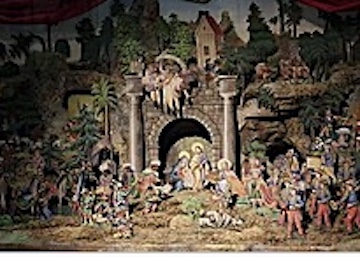Illustration: The building of a manger scene in the home is a well-known example of popular piety, influenced by St. Francis of Assisi’s crib in Greccio.(1885
Pope Francis Apostolic Journey to Ajaccio
on the occasione of the Congress
“La Religiosité Populaire en Méditerranée”
“Palais des Congrès et d’Exposition d’Ajaccio” – Sunday, 15 December 2024
Your Eminence,
Dear Brothers in the Episcopate,
Dear Priests and Religious,
Dear Sisters and Brothers,
I am pleased to meet you here in Ajaccio at the end of this Congress on popular piety in the Mediterranean, which has brought together a number of scholars and Bishops from France and other countries.
The countries bordering the Mediterranean have a long history and have been the cradle of many highly developed civilisations. The Greco-Roman and Judaeo-Christian civilisations come to mind as examples of the cultural, religious and historical importance of this immense “lake” in the middle of three continents, this unique sea that is the Mediterranean.
We must not forget that in classical literature, both Greek and Latin, the Mediterranean was often the setting for the birth of myths, stories and legends. Philosophical thought and the arts, as well as navigational techniques, enabled the civilizations of the Mare Nostrum to develop an high culture, to open up routes of communication, to build infrastructures and aqueducts, and, even more, to create legal systems and complex institutions whose basic principles have endure and are still relevant today.
Between the Mediterranean and the Middle East, a unique religious experience was born, linked to the God of Israel, who revealed himself to humanity and began an ongoing dialogue with his people.
This dialogue culminated in the unique presence of Jesus, the Son of God.
He revealed in a definitive way the face of the Father, his and ours, and brought to fulfilment the covenant between God and humanity.
More than two thousand years have passed since the Incarnation of the Son of God, and since then, many ages and cultures have come and gone.
In some periods of history, the Christian faith has shaped the lives of peoples and their political institutions, whereas today, especially in European countries, the question of God seems to be receding as people become increasingly indifferent to his presence and his Word.
In analyzing this scenario, however, we must beware of hasty considerations and ideological judgements which, even in our day, would pit Christian culture against secular culture.
This is a mistake!
Instead, it is important to recognize a mutual openness between these two horizons.
Believers are increasingly open to, and at peace with the possibility of practicing their faith without imposing it, living it as a leaven in the world and in their communities.
Non-believers or those who have distanced themselves from religious practice are not strangers to the search for truth, justice and solidarity.
Often, even if they do not belong to any religion, they carry in their hearts a great thirst, a search for meaning, that leads them to reflect on the mystery of life and to seek fundamental values for the common good.
In this context, we can appreciate the beauty and importance of popular piety.
It was St. Paul VI who in Evangelii Nuntiandi changed the name from “religiosity” to popular “piety”.
On the one hand, popular piety points back to the Incarnation as the foundation of the Christian faith, which is always expressed in the culture, history and languages of a people and transmitted through the symbols, customs, rites and traditions of a living community.
On the other hand, this piety also attracts and involves people who are on the threshold of faith.
Although they may not practice their faith regularly, popular piety enables them to experience their roots and affections, and to encounter ideals and values that they find useful for their own lives and for society.
By expressing faith through simple gestures and a symbolic language rooted in the culture of the people, popular piety reveals God’s presence in the living flesh of history, strengthens the relationship with the Church and often becomes an occasion for encounter, cultural exchange and celebration.
It is curious: a piety that is not festive does not “have a good aroma”, it is not a piety that comes from the people, it is too “distilled”.
In this sense, its practices give life to the relationship with the Lord and to the content of the faith.
In this regard, I would like to mention a reflection by Blaise Pascal.
In a dialogue with a fictional interlocutor about how to come to faith, Pascal says that it is not enough to multiply the proofs of God’s existence or to make great intellectual efforts.
Rather, one must look to those who have already made great progress on the path, because they began with small steps, by “taking holy water and having Masses said” (Pensieri, Opere complete, Milan, 2020, n. 681). It is about the small steps that take you forward.
Popular piety is a devotion that is involved with culture but not confused with it. It takes small steps.
Nor should we forget that “popular piety enables us to see how the faith, once received, is embodied in a culture and is constantly handed on”, and that it is therefore, “an active evangelizing forvr which we must not underestimate: to do so would be to fail to recognize the action of the Holy Spirit” (Evangelii Gaudium, 123; 126).
The Holy Spirit works through the holy People of God, guiding them in their daily discernment. We think of Deacon Philip, a poor man, who one day, being led [by the Spirit] along a road, heard a pagan, a servant of Queen Candice of Ethiopia, reading the prophet Isaiah and not understanding.
He approached and asked, “Do you understand?” The pagan replied, “No”. So Philip proclaimed the Gospel to him. The Gentile, who had then received faith, went to where there was water and asked, “Philip, can you baptise me now, here in this water?”
Philip did not say, “No, he has to doa course, he has to bring the godparents, both of them have to be married in the Church, or he has to do this….” No, he baptized him. Baptism is the gift of faith that Jesus gives us.
We must be careful so that popular piety is not used or exploited by groups that seek self-aggrandizement by fomenting polemics, narrow-mindedness, divisions and exclusivist attitudes.
None of this corresponds to the Christian spirit of popular piety, and everyone, especially the Church’s Pastors, is called to be vigilant, discerning and constantly attentive to popular forms of religiosity.
When popular piety succeeds in communicating the Christian faith and the cultural values of a given people, uniting hearts and building community, it bears great fruit that affects on society as a whole, including relations between political and social institutions and the Church.
Faith cannot remain a private matter.
I would say that the privatisation of faith is a heretical development.
It is a fact that is limited to the sanctuary of the individual conscience, but if it wants to be fully faithful to itself, authentic faith involves a call to commitment and witness, to the promotion of human development, social progress and the care of creation, all in the name of charity.
For this very reason, over the centuries, the profession of the Christian faith and models of community life inspired by the Gospel and the sacraments have given rise to countless works of solidarity, including the creation of institutions such as hospitals, schools, care centres – there are many in France! – which have enabled the faithful to help those in need and to contribute to the promotion of the common good. Popular piety, processions and rogations, the charitable activities of confraternities, the recitation of the Holy Rosary together and other forms of devotion can foster “constructive citizenship” on the part of Christians.
Sometimes some intellectuals, some theologians do not understand this.
I remember once I was in northern Argentina, in Salta, for a week, and there was a celebration of the Lord of Miracles. The whole province comes to the Shrine and all the people go to confession, from the mayor down, because they have this devotion in them. I used to go to confession all the time, and it was a tiring work because all the people confess.
One day, on my way out, I found a priest I knew and I said, “Oh, you are here, how are you?”
He replied “Good!” As we were going out, at that moment a lady approached with some holy cards in her hand and she said to the priest, a good theologian, “Father, will you bless them?”
The priest, with great theology, says to her, “But, madam, have you been to Mass?”.
She replied “Yes, Father”.
He said, “Do you know that at the end of Mass, everything is blessed?”
She replied, “Yes, Father”.
He continued, “Do you know that God’s blessing comes down upon you?”.
She replied “Yes, Father.”
At that moment another priest called him, “Oh, how are you?”
The lady who had repeated so many times “yes, Father” turned to the other one and said, “Father, will you bless them for me?”
There is a desire for help, a healthy desire for help that seeks the Lord’s blessing and does not accept generalizations.
At the same time, on the common ground of courageously doing good works, of asking for blessings, that believers can also find themselves cooperating with secular, civil and political institutions in the service of each person, beginning with the poor, for an integral human growth and the care of this “Île de beauté”.
Hence the need to develop a concept of secularity (laïcité) that is not static and fixed, but evolving and dynamic, capable of adapting to different and unforeseen situations, and of promoting constant collaboration between civil and ecclesial authorities for the good of the whole community, each within the limits of its own competences and areas of activity.
As Benedict XVI has said, a healthy secularity “frees religion from the burden of politics and allows politics to be enriched by the contribution of religion, while maintaining the necessary distance, clear distinction and indispensable collaboration between the two spheres… This kind of healthy secularity ensures that political activity does not manipulate religion, while the practice of religion remains free from a politics of self-interest that is sometimes difficult to reconcile with, if not antithetical to, religious faith. For this reason, a healthy secularity, embodying unity in diversity, is necessary and even vital for both spheres” (Ecclesia in Medio Oriente, 29). Benedict XVI referred to a healthy secularism, but alongside a religious one. Both spheres are respected.
In this way, more effective forms of cooperation can be developed, without prejudice or opposition, in an open, frank and fruitful dialogue.
Dear sisters and brothers, popular piety, which is deeply rooted here in Corsica – it is not superstition – highlights the values of faith and at the same time expresses the distinctiveness, the history and the culture of this people.
A constant dialogue between the religious and secular spheres, between the Church and the civil and political institutions, can take place in this interweaving, without confusing the two..
You have been following this path for a long time, it is your unique tradition and you are an admirable example in Europe. Keep on going! I would also like to encourage young people to participate even more actively in social, cultural and political life, inspired by solid ideals and a passion for the common good.
I also urge the pastors and faithful of the Church, as well as politicians and public figures, to remain ever close to the people, listening to their needs, sharing their sufferings and expressing their hopes, for true authority grows only through closeness to others.
Pastors must have this closeness: to God, to other pastors, to priests and to the people.
These are the true pastors. But the pastor who does not have this closeness, even to history and culture, is simply “Monsieur l’Abbé”. He is not a pastor.
We must distinguish between these two ways of doing pastoral work.
I hope that this Congress on popular piety will help you to rediscover the roots of your faith and to bear fruit in a renewed commitment, in the Church and in civil society, at the service of the Gospel and the common good of all citizens.
May Mary, Mother of the Church, accompany you and help you on your journey. Thank you very much.


